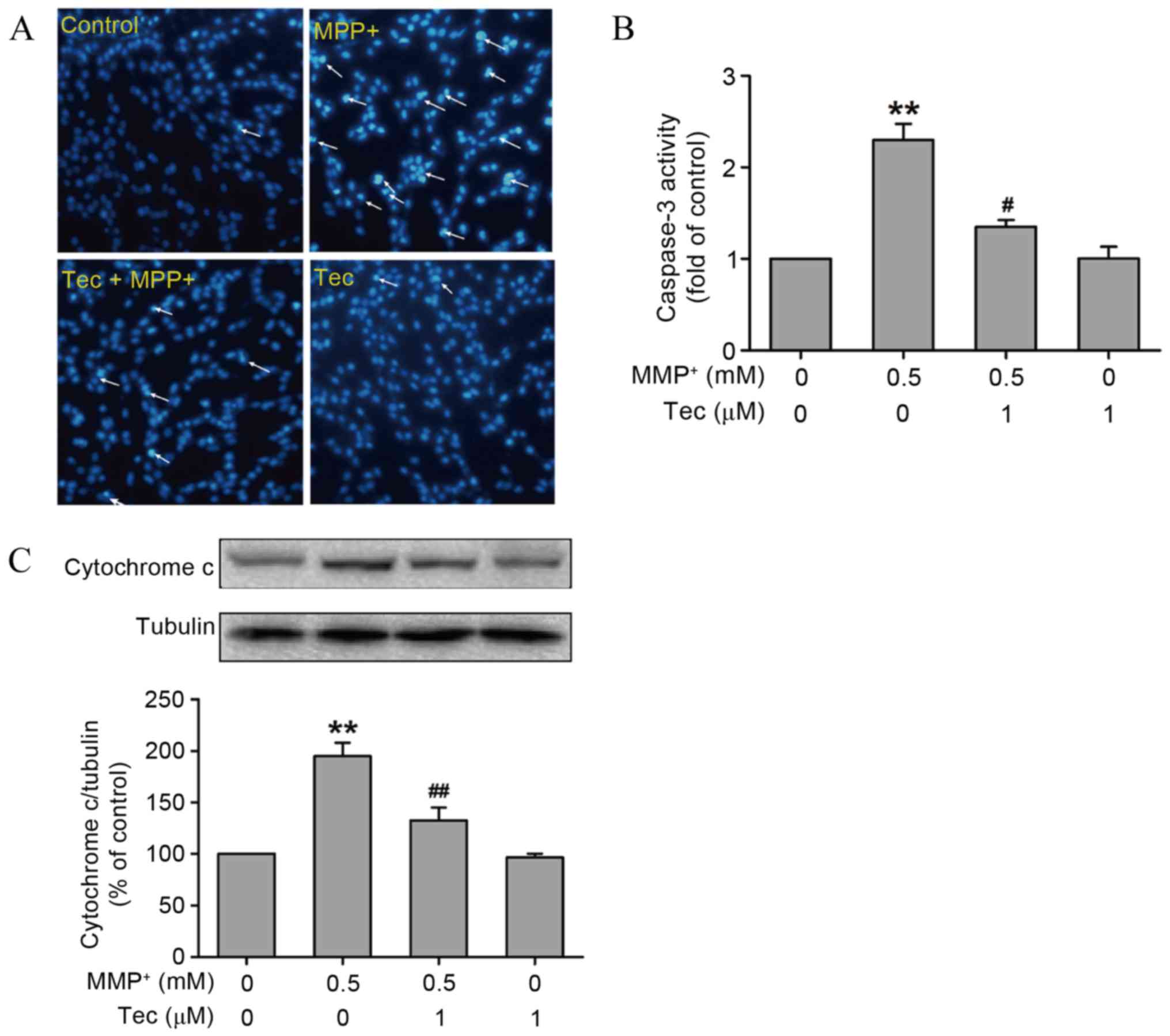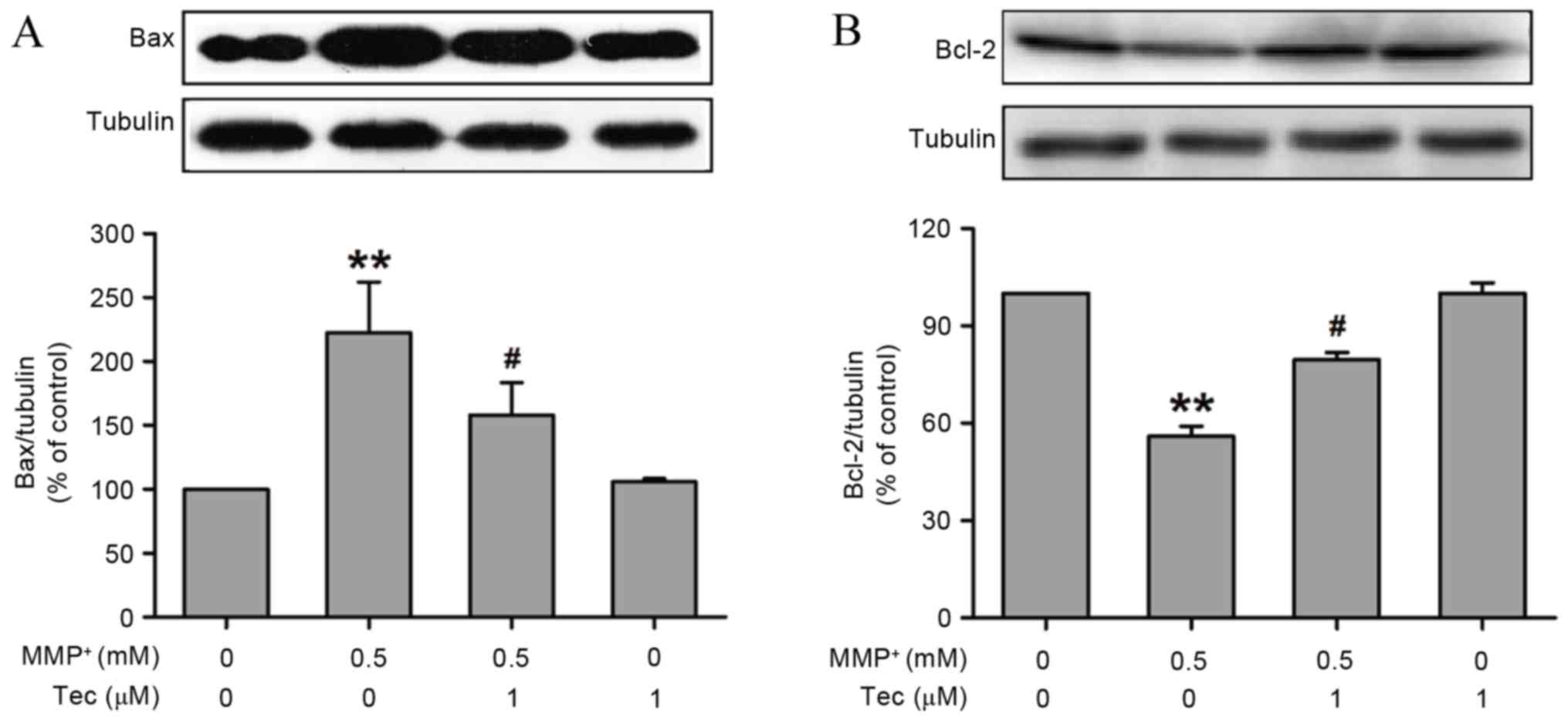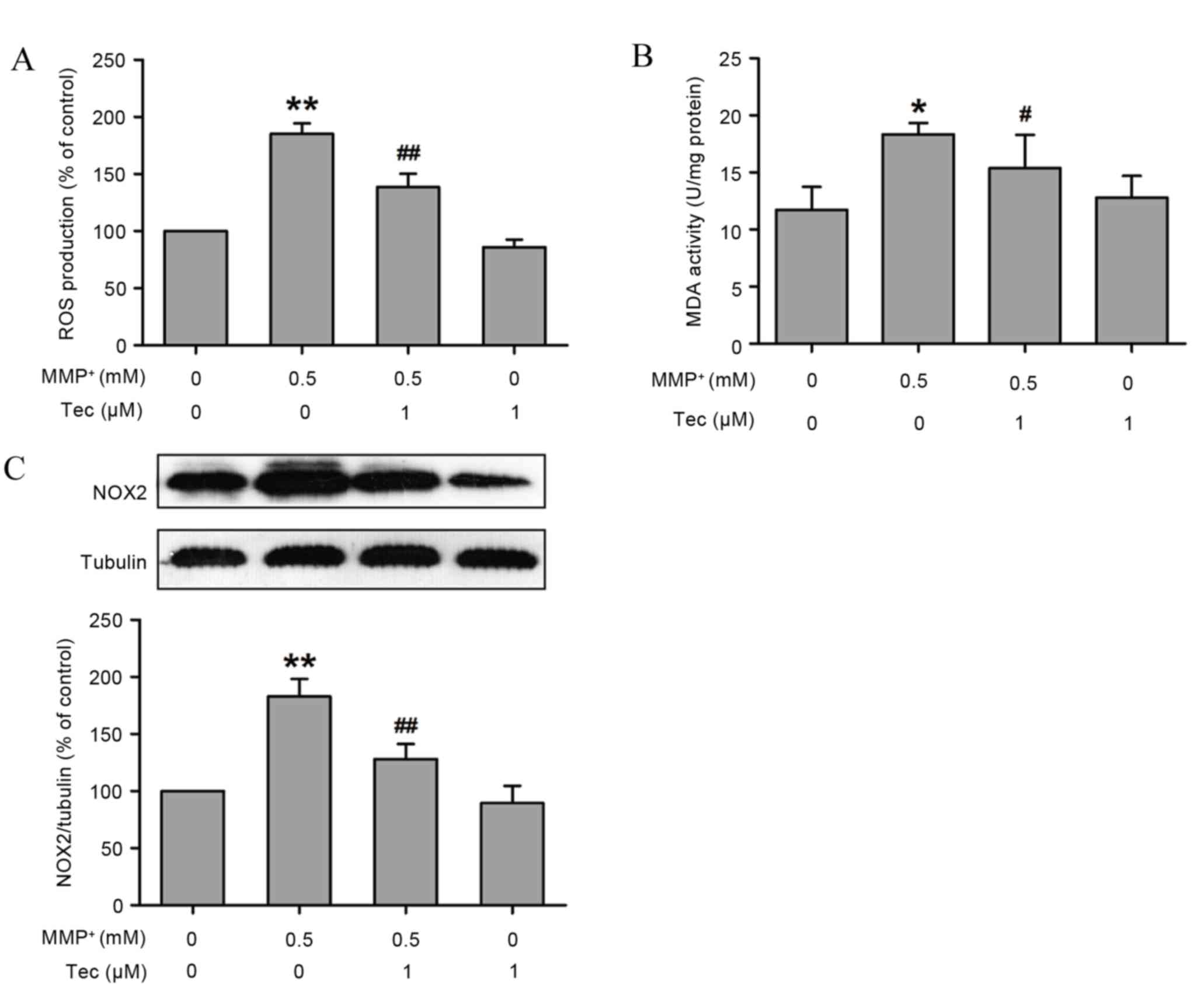|
1
|
Lo Bianco C, Schneider BL, Bauer M, Sajadi
A, Brice A, Iwatsubo T and Aebischer P: Lentiviral vector delivery
of parkin prevents dopaminergic degeneration in an alpha-synuclein
rat model of Parkinson's disease. Proc Natl Acad Sci USA.
101:17510–17515. 2004. View Article : Google Scholar : PubMed/NCBI
|
|
2
|
Jellinger KA: The pathology of Parkinson's
disease. Adv Neurol. 86:55–72. 2001.PubMed/NCBI
|
|
3
|
Bales A, Peterson MJ, Ojha S, Upadhaya K,
Adhikari B and Barrett B: Associations between betel nut (Areca
catechu) and symptoms of schizophrenia among patients in Nepal:
A longitudinal study. Psychiatry Res. 169:203–211. 2009. View Article : Google Scholar : PubMed/NCBI
|
|
4
|
Beal MF: Mitochondria, oxidative damage,
and inflammation in Parkinson's disease. Ann N Y Acad Sci.
991:120–131. 2003. View Article : Google Scholar : PubMed/NCBI
|
|
5
|
Moon HE and Paek SH: Mitochondrial
dysfunction in Parkinson's disease. Exp Neurobiol. 24:103–116.
2015. View Article : Google Scholar : PubMed/NCBI
|
|
6
|
Blesa J, Trigo-Damas I, Quiroga-Varela A
and Jackson-Lewis VR: Oxidative stress and Parkinson's disease.
Front Neuroanat. 9:912015. View Article : Google Scholar : PubMed/NCBI
|
|
7
|
Kim GH, Kim JE, Rhie SJ and Yoon S: The
role of oxidative stress in neurodegenerative diseases. Exp
neurobiol. 24:325–340. 2015. View Article : Google Scholar : PubMed/NCBI
|
|
8
|
Turski L, Bressler K, Rettig KJ, Loschmann
PA and Wachtel H: Protection of substantia nigra from
MPP+ neurotoxicity by N-methyl-D-aspartate antagonists.
Nature. 349:414–418. 1991. View
Article : Google Scholar : PubMed/NCBI
|
|
9
|
Singer TP and Ramsay RR: Mechanism of the
neurotoxicity of MPTP. An update. FEBS Lett. 274:1–8. 1990.
View Article : Google Scholar : PubMed/NCBI
|
|
10
|
Han YO, Han MJ, Park SH and Kim DH:
Protective effects of kakkalide from Flos puerariae on
ethanol-induced lethality and hepatic injury are dependent on its
biotransformation by human intestinal microflora. J pharmacol Sci.
93:331–336. 2003. View Article : Google Scholar : PubMed/NCBI
|
|
11
|
Gutierrez-Zepeda A, Santell R, Wu Z, Brown
M, Wu Y, Khan I, Link CD, Zhao B and Luo Y: Soy isoflavone
glycitein protects against beta amyloid-induced toxicity and
oxidative stress in transgenic Caenorhabditis elegans. BMC
Neurosci. 6:542005. View Article : Google Scholar : PubMed/NCBI
|
|
12
|
Yuan D, Xie YY, Bai X, Wu X, Yang JY and
Wu CF: Inhibitory activity of isoflavones of Pueraria flowers on
nitric oxide production from lipopolysaccharide-activated primary
rat microglia. J Asian Nat Prod Res. 11:471–481. 2009. View Article : Google Scholar : PubMed/NCBI
|
|
13
|
Han T, Cheng G, Liu Y, Yang H, Hu YT and
Huang W: in vitro evaluation of tectoridin, tectorigenin and
tectorigenin sodium sulfonate on antioxidant properties. Food Chem
Toxicol. 50:409–414. 2012. View Article : Google Scholar : PubMed/NCBI
|
|
14
|
Park EK, Shin YW, Lee HU, Lee CS and Kim
DH: Passive cutaneous anaphylaxis-inhibitory action of
tectorigenin, a metabolite of tectoridin by intestinal microflora.
Biol Pharm Bull. 27:1099–1102. 2004. View Article : Google Scholar : PubMed/NCBI
|
|
15
|
Lee KT, Sohn IC, Kim DH, Choi JW, Kwon SH
and Park HJ: Hypoglycemic and hypolipidemic effects of tectorigenin
and kaikasaponin III in the streptozotocin-lnduced diabetic rat and
their antioxidant activity in vitro. Arch Pharm Res. 23:461–466.
2000. View Article : Google Scholar : PubMed/NCBI
|
|
16
|
Kang KA, Lee KH, Chae S, Zhang R, Jung MS,
Kim SY, Kim HS, Kim DH and Hyun JW: Cytoprotective effect of
tectorigenin, a metabolite formed by transformation of tectoridin
by intestinal microflora, on oxidative stress induced by hydrogen
peroxide. Eur J pharmacol. 519:16–23. 2005. View Article : Google Scholar : PubMed/NCBI
|
|
17
|
Park JS, Jung JS, Jeong YH, Hyun JW, Le
TK, Kim DH, Choi EC and Kim HS: Antioxidant mechanism of isoflavone
metabolites in hydrogen peroxide-stimulated rat primary astrocytes:
Critical role of hemeoxygenase-1 and NQO1 expression. J neurochem.
119:909–919. 2011. View Article : Google Scholar : PubMed/NCBI
|
|
18
|
Racher AJ, Looby D and Griffiths JB: Use
of lactate dehydrogenase release to assess changes in culture
viability. Cytotechnology. 3:301–307. 1990. View Article : Google Scholar : PubMed/NCBI
|
|
19
|
Katunina EA, Titova NV, Malykhina EA,
Gasanov MG, Makarova AA, Voronina TA, Nerobkova LN, Valdman EA and
Avakyan GN: Oxidative stress and Parkinson's disease: Mechanisms
and perspectives of treatment. Zh Nevrol Psikhiatr Im S S
Korsakova. 115:141–145. 2015. View Article : Google Scholar : PubMed/NCBI
|
|
20
|
Sorce S and Krause KH: NOX enzymes in the
central nervous system: From signaling to disease. Antioxid redox
signal. 11:2481–2504. 2009. View Article : Google Scholar : PubMed/NCBI
|
|
21
|
Markey SP, Johannessen JN, Chiueh CC,
Burns RS and Herkenham MA: Intraneuronal generation of a pyridinium
metabolite may cause drug-induced parkinsonism. Nature.
311:464–467. 1984. View
Article : Google Scholar : PubMed/NCBI
|
|
22
|
Khwanraj K, Phruksaniyom C, Madlah S and
Dharmasaroja P: Differential expression of tyrosine hydroxylase
protein and apoptosis-related genes in differentiated and
undifferentiated SH-SY5Y neuroblastoma cells treated with
MPP+. Neurol Res Int. 2015:7347032015. View Article : Google Scholar : PubMed/NCBI
|
|
23
|
Subramaniam SR and Chesselet MF:
Mitochondrial dysfunction and oxidative stress in Parkinson's
disease. Prog Neurobiol. 106–107:17–32. 2013. View Article : Google Scholar
|
|
24
|
Houghton PJ and Howes MJ: Natural products
and derivatives affecting neurotransmission relevant to Alzheimer's
and Parkinson's disease. Neurosignals. 14:6–22. 2005. View Article : Google Scholar : PubMed/NCBI
|
|
25
|
Mythri RB, Harish G and Bharath MM:
Therapeutic potential of natural products in Parkinson's disease.
Recent Pat Endocr Metab Immune Drug Discov. 6:181–200. 2012.
View Article : Google Scholar : PubMed/NCBI
|
|
26
|
Fu W, Zhuang W, Zhou S and Wang X:
Plant-derived neuroprotective agents in Parkinson's disease. Am J
Transl Res. 7:1189–1202. 2015.PubMed/NCBI
|
|
27
|
Jang MH, Shin MC, Kim YJ, Chung JH, Yim
SV, Kim EH, Kim Y and Kim CJ: Protective effects of Puerariae
flos against ethanol-induced apoptosis on human neuroblastoma
cell line SK-N-MC. Jap J Pharmacol. 87:338–342. 2001. View Article : Google Scholar : PubMed/NCBI
|
|
28
|
Stadtman ER: Role of oxidant species in
aging. Curr Med Chem. 11:1105–1112. 2004. View Article : Google Scholar : PubMed/NCBI
|
|
29
|
Lohr JB and Browning JA: Free radical
involvement in neuropsychiatric illnesses. Psychopharmacol Bull.
31:159–165. 1995.PubMed/NCBI
|
|
30
|
Di Monte D, Sandy MS, Ekström G and Smith
MT: Comparative studies on the mechanisms of paraquat and
1-methyl-4-phenylpyridine (MPP+) cytotoxicity. Biochem
Biophys Res Commun. 137:303–309. 1986. View Article : Google Scholar : PubMed/NCBI
|



















